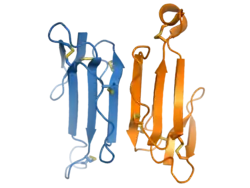κ-Bungarotoxin
κ-Bungarotoxin (synonym Toxin F)[1] ist ein Protein und Neurotoxin aus der Schlange Bungarus multicinctus.
| Kappa-bungarotoxin | ||
|---|---|---|
 | ||
| nach PDB 1KBA | ||
| Andere Namen |
Kappa-1-bungarotoxin, Long neurotoxin 2, Neuronal bungarotoxin | |
| Masse/Länge Primärstruktur | 87 Aminosäuren, 9.566 Da | |
| Bezeichner | ||
| Externe IDs | ||
Eigenschaften
κ-Bungarotoxin wird in der Giftdrüse gebildet. Es bindet und hemmt nikotinische Acetylcholinrezeptoren mit einer IC50 von 100 nM. Es ist ein reversibler Antagonist insbesondere von alpha-3/CHRNA3 und in geringerem Umfang von alpha-4/CHRNA4-Acetylcholinrezeptoren. Im Gegensatz zum verwandten α-Bungarotoxin hemmt κ-Bungarotoxin das ganglion ciliare von Hühnern, weshalb es in der Reihe mit den anderen Bungarotoxinen mit dem griechischen Buchstaben 'κ' (als Allusion auf das lateinische ciliare) bezeichnet wurde.[2] Wie das α-Bungarotoxin wirkt κ-Bungarotoxin postsynaptisch, während β-Bungarotoxin präsynaptisch wirkt.[3]
Weblinks
Einzelnachweise
- R. H. Loring, D. Andrews, W. Lane, R. E. Zigmond: Amino acid sequence of toxin F, a snake venom toxin that blocks neuronal nicotinic receptors. In: Brain research. Band 385, Nummer 1, Oktober 1986, S. 30–37, PMID 3021284.
- V. A. Chiappinelli: Kappa-bungarotoxin: a probe for the neuronal nicotinic receptor in the avian ciliary ganglion. In: Brain research. Band 277, Nummer 1, Oktober 1983, S. 9–22, PMID 6139146.
- U. K. Ranawaka, D. G. Lalloo, H. J. de Silva: Neurotoxicity in snakebite–the limits of our knowledge. In: PLoS neglected tropical diseases. Band 7, Nummer 10, 2013, S. e2302, doi:10.1371/journal.pntd.0002302, PMID 24130909, PMC 3794919 (freier Volltext).